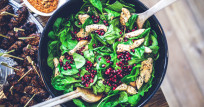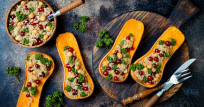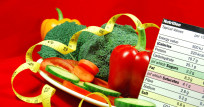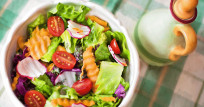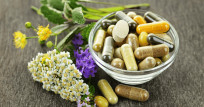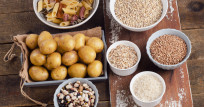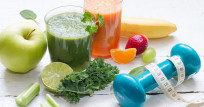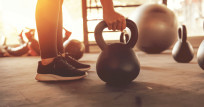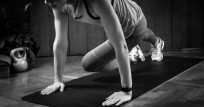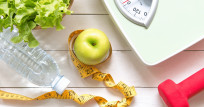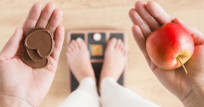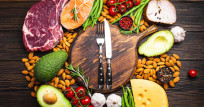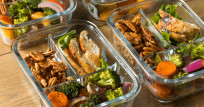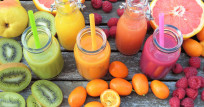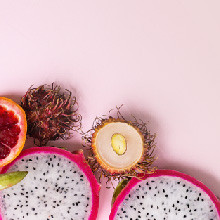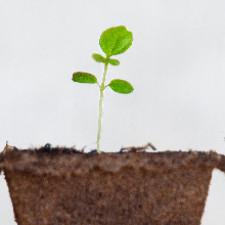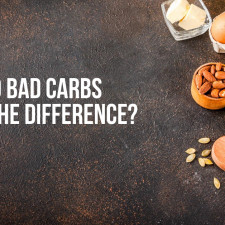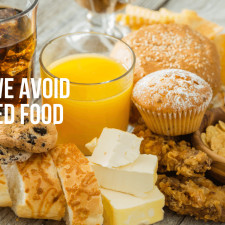Eight eating principles for a healthy lifestyle
“What should I eat to be healthy and lose weight?” I’m being asked this question every single day. From my friends, clients, or random strangers (when they learn what I do for a living).
And I don’t blame them for not knowing. We have so many food choices - from ‘local’ to wholesome organic to supersized processed to fitness food.
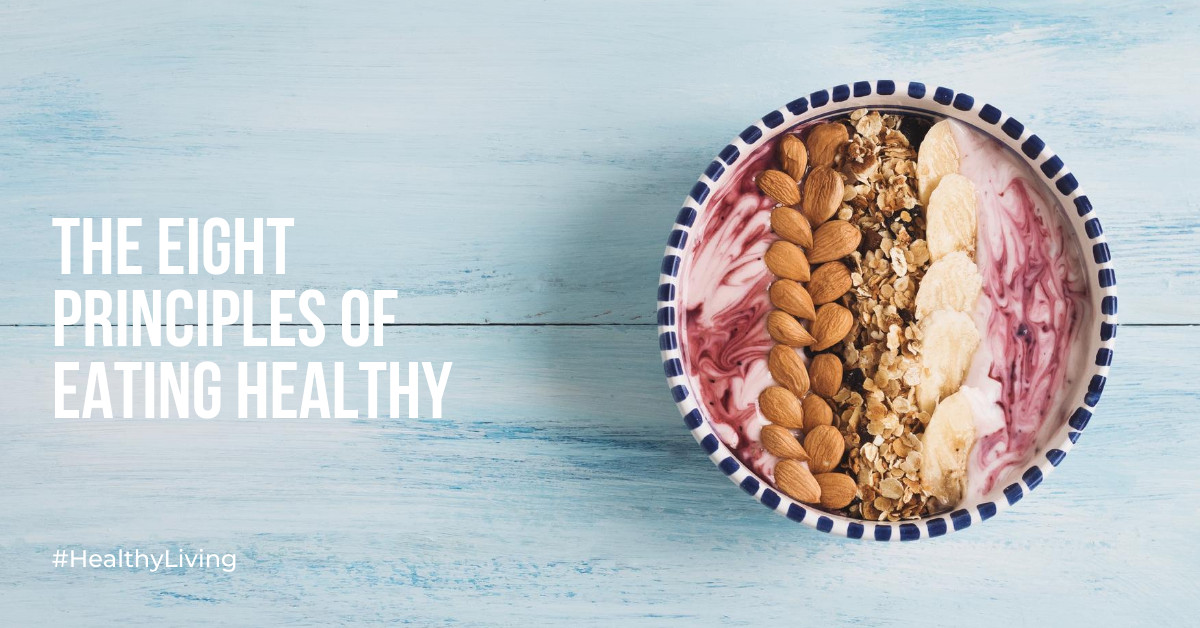
Answering this question can be confusing and it depends on whom you ask. Many social media ‘experts’ are teaming up with companies to market products that are claiming to be ‘healthy’ with only ‘natural ingredients’. If something is natural, it doesn't necessarily mean it is healthy!
“Just because something is labeled as natural, it doesn't necessarily mean it's safe!”
I’m going to share with you my eight eating principles that I have followed for almost a decade now. Same principles that I'm teaching my clients. You can tweak them as required to your unique needs.
I hope it will help you to steer away from “edible food-like substances” towards a sustainable, enjoyable, and healthy lifestyle.
Best Diet When You Exercise
There are a few benefits that pills, powders, or sports drinks might provide to some athletes or normal humans like you and me.
But they all FAIL in comparison to those on a proper eating diet.
NO product or supplement can make up for poor eating habits!
The very first thing I teach my clients is one of the hard truths “Stop doing what everybody else does!”
There is no ‘one-size-fits-all’ approach. If you are a young man wanting to put on muscle, you will require a different diet than a middle-aged woman seeking to lose weight.
Here are the general eight principles of healthy eating I’ve been following put together by Robert J. Davis PhD, aka The Healthy Skeptic, who examines the science behind popular health claims, revealing what’s believable and what’s not.
1. Eat Protein At Every Meal
I teach my clients to include protein at every meal from various sources such as fish, poultry, dairy, eggs, beans, tofu, and nuts. Red meat and processed meat - try to minimize the consumption of it.
However, I do love a good fried Spam from time to time. For my vegetarian and vegan friends - make sure you are eating a variety of plant-based protein, as most are not complete proteins.
2. Eat Complex Carbs
“The whiter the bread, the sooner you'll be dead” is a saying by bestselling author Michael Pollan. Ever since I heard it, I haven't eaten white bread. And I don't miss it either.
My go-to is ‘complex carbs’ which include whole grains, beans, and fruits. Don't forget to eat your veggies as well.
I know it is challenging if not impossible - but please minimize the consumption of refined carbs such as white bread, chips, cookies, and candy. I teach my clients to have a ‘treat day’ where they can treat themselves to whatever their heart desires.
3. Add Healthy Fats To Your Diet
Ok, let me start by saying that ‘low-fat’ doesn't necessarily mean that it is healthy.
Stop being scared of healthy fats such as fatty fish, avocado, nuts, and seeds. They are the ‘good’ guys.
4. Hydrate
Hydration is important as up to 60% of the human adult body is water. My advice is to stick with water. I add a squirt of lemon juice and a pinch of pink Himalayan salt (mineral-rich) in my filtered water.
Sports beverages that contain fluids, carbs, and electrolytes are useful for athletes engaged in vigorous exercise for more than an hour, especially in hot weather. But for most of us non-athletes, they offer no real benefits over plain water, while providing extra calories and sugar we don't really need.
Try to minimize your intake of soda drinks, they are known to stimulate your appetite and weight gain! And yes, even diet soda or any other ‘diet’ drinks!
And for the fruit juices lovers - please keep in mind that fruit juice can have as much sugar as soda, so consume it wisely.
I haven't forgotten about ‘booze’. Drink alcohol in moderation, meaning one drink a day for women and two for men.
Your body will let you know when you are lacking in hydration. You will feel bloated and sluggish, ‘water retention” will occur.
5. Forget About Fad Diets
I don't even know where to start with this one. I keep saying it over and over again until people realize it - eating plans aka ‘diets’ that require you to eat (or avoid completely) specific foods, eating different food on different days, or confining your eating to certain hours ARE TOO RESTRICTIVE, complicated and absolutely not sustainable for an extended period.
Over the long run, they don’t work for weight loss, as the majority of people on a ‘diet’ will gain all the weight back and then some. Furthermore, they haven’t been proven to enhance exercise performance.
I teach my clients how to create a sustainable lifestyle where they can eat all their favorite food while getting healthier and more vital.
6. Always Read The Ingredients List
It is getting more and more difficult to avoid packaged foods. Before you pay for it, please check the ingredients first. If it includes a list of gibberish, unpronounceable words - that's a big red flag!
Harvard School of Public Health explains how to decode the ingredients list easily.
Quick tip: The ingredients are listed in order of quantity by weight. This means that the food ingredient that weighs the most will be listed first, and the ingredient that weighs the least is listed last.
7. Ignore Health-Related Marketing Claims
I “love” this marketing gimmick!
I used to fall for it every single time I saw products labeled as “organic”, “natural”, “multigrain”, “gluten-free”, “vitamin-fortified” or “low GI”. These labels don't necessarily mean it's healthful!
Robert J. Davis, PhD. states, that when foods are marketed with this type of ‘health halo’ people are more likely to overeat them. I was overindulging in “fitness” snacks and energy bars.
8. How To Pick Your Energy Bar
My trainer calls energy bars ‘glorified candy bars’. Here applies rule nr. 6 - read the ingredients list as well.
Some of the energy bars have as much sugar as candy. Even bars labeled “natural” are adding multiple forms of sugar including honey, brown rice syrup, and agave nectar.
Yes, these sweeteners are natural, but I know people who eat more than one energy bar in one sitting. Hence, loading up on several in one sitting is no different from eating a high sugar chocolate bar.
I usually aim for energy bars with less than 10-15 grams of sugar.
PRO TIP: If using an energy bar as a snack, aim for 150-250 calorie bars. If it’s about 300 or 350 calories, just eat half and save the rest. Good luck with that! To make it a meal, pair with a piece of fresh fruit and Greek yogurt or cottage cheese.
In some cases, these products are sweetened with sugar substitutes known as ‘sugar alcohols’ (usually identifiable with words ending in -ol on the ingredients list). Sugar alcohol can cause gas, bloating, and diarrhea!
Also, please check for any added vitamins, minerals, or caffeine - you might not want it.
Bottom Line: I know it sounds complicated and overwhelming. It can get that way. That's why I break it down into small, achievable steps when I teach it to my clients to ensure a successful and lasting change.
Let’s talk so you can start living a healthy and vital life.
I know YOU CAN! Do you?
-
Marcela CmarkovaLifestyleCoaching€ 1,42 pm
-
shivam rodhiyaHealth & fitness€ 0,59 pm
-
Rose Marie NelsonLife Coach€ 2,09 pm
-
Jose W.Digital marketing€ 2,50 pm
-
Desri GoodwinWellbeing coach€ 1,25 pm
-
Dalya SalmanTutor, Healthcare€ 0,53 pm
